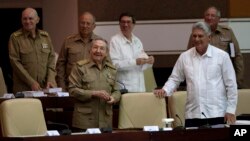Cuba's parliament opened one of its twice-annual regular sessions Wednesday with a new twist: It's been reporting the event through the day with updates on Twitter and Facebook.
President Raul Castro gave a closing address at the gathering, but his full speech was not immediately available. They were his first public remarks since the United States and Cuba announced they will re-establish diplomatic relations on Monday and reopen embassies in each other's respective capitals.
State-run website Cubadebate posted a photograph of workers at the Cuban Interests Section in Washington removing a plaque identifying it as such, ahead of its ceremonial inauguration as an embassy next week.
At parliament, officials reported that Cuba recorded economic growth of 4.7 percent in the first half of the year. That was up from a forecast of 4 percent offered last month; annual growth is expected to come in around 4 percent.
“This is very good, taking into account that last year we only grew one percent,” Castro said, according to Cubadebate.
“Nevertheless, in order to achieve this hoped-for 4 percent, we must work hard and with lots of discipline.”
The National Assembly was also signing off on a final budget report for 2014.
Foreign journalists weren't allowed access to the gathering at a convention center in western Havana, and the meeting was not televised. However proceedings are usually broadcast on state TV later in the day.
But on its recently activated Twitter account and Facebook page, both of which apparently went live July 11, the National Assembly was publishing snippets from Wednesday's gathering. Cubadebate confirmed the two accounts' authenticity.
The early messages were not dramatic. One reported parliament president Esteban Lazo had called the body to order with homages to 19th-century independence figure Mariana Grajales, known here as the “mother of Cuba.”
It's a highly unusual use of social media for a country that has largely fallen behind much of the world in terms of Internet connectivity, and is unlikely to be seen in real-time by many on the island.
Cubans are increasingly using the likes of Facebook and Twitter as authorities slowly expand connectivity options, but most islanders who are able to connect do so only sporadically and briefly, limited by cost, availability and scant bandwidth.




